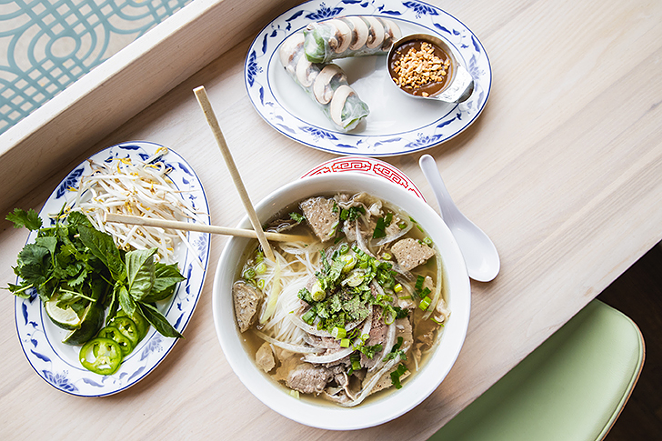Cincinnati’s first Asian Food Week wraps up Sunday, but there’s still plenty of time to show love to the participating restaurants — this week and beyond. Expanded from Asian Food Fest, an annual weekend celebration of Asian foods (canceled this year by COVID-19), Asian Food Week features more than 35 participating restaurants offering three-course meals (or a special off-the-menu offering) for $20.
[All the food you can try during Cincinnati's first Asian Food Week.]
Asianati, the organizing body behind both events, calls itself a “one-stop guide for Asian food in Greater Cincinnati” and is dedicated to celebrating Asian food culture in the region through its extensive website and accompanying blog.
“Our ultimate goal is one day, we want something like an Asia Town, where there’s a community of people that come together and it just speeds off,” said co-founder Koji Sado.
“(We thought) what if we start something like a website to begin with? We can help the local businesses, give a little more background and education to people who aren’t that aware or know what’s out there because there’s a lot of hidden gems in Cincinnati. You just have to go out and find it.”
Asian restaurants are often relegated to specialized categories on best-of lists — best dumplings in town, best international cuisine — but that kind of exoticized categorization unnecessarily restricts the perception of Asian restaurants to a box of “other."
“I’m really interested in telling the stories and the histories and the culture and the real meaning and significance behind this food, not just, ‘this is a really good pan-fried dumpling, and here’s some places to get it,’” says Caitlin Behle, co-editor of Asianati’s blog.
“Asian Food Week is really an opportunity for us to celebrate what is a beautiful community of Asian restaurants that also make really damn good food.”
Participating restaurants include those that offer Indian and Middle Eastern cuisine. While many might equate “Asian” specifically with far East countries, the broader continent of Asia is represented here.
“I think it’s nice to kind of give the city exposure of all the different cuisines that the Asian continent has to offer, looking through all the different people involved, you have a pretty nice spread,” says Kam Siu, owner and founder of Dope! Asian Street Fare.
“We wanted to join because we felt like our cuisines were varied versus what everybody else is doing in terms of flavor profile.”
Dope serves up innovative dishes inspired by several Asian cities, with specialized takes on everything from ramen to dumplings to wings. Located within the food hall of the year-old downtown Kroger, Dope rolled with the punches when COVID-19 hit.
“We definitely lost almost all of our dine-in lunch base since none of the businesses are really back,” Siu says.
But the entrepreneur, who also owns and runs Panda Trading Company, an ingredient and supply store for Asian restaurants in Cincinnati, jumped on the food-delivery trend right away.
“Eighty percent of our business is all through third-party sources. The dine-in and carry-out, whoever’s downtown, they still stop in to support us. We see a lot of regulars,” Siu says.
COVID-19’s impact on the broader Asian food community was marked. A March study from data company Womply found Chinese restaurant revenue declined in New York in the immediate wake of the pandemic’s beginning by nearly 20%, and many outlets have reported on the shuttering of restaurants in the pandemic’s aftermath, both Asian and non-Asian.
“When you think about, ‘What restaurant do I want to eat from during a pandemic?’, there’s this sort of lingering perception that Asian restaurants might not be safe, or unfortunately, the Asian people working there might not be safe,’” says Behle.
A silver lining for Siu and Dope amid the pandemic: the restaurant is expanding to a second location in Anderson Township on Nov. 20, with the same fresh take on multi-country cuisines.
“Whatever we decide to do with our menu, it has to be approachable for the general public, but at the same time sticking true to the roots, and I feel we do that. We are a good representation of the Asian food cuisine,” Siu says. “We do a really good job; once people come in and try us out, they come back. We capture them.”
Participating Asian Food Week restaurants span from Banana Leaf Modern Thai in the suburb of Mason to Northside’s Bridges (Nepalese) to Christine’s Casual Dining (Filipino) in Dent to Guru Indian in Crescent Springs. Previews of each restaurant’s three-course menu offerings (or special off-the-menu items) are available on Asianati’s website.
Ultimately, food is the great equalizer. Everyone needs it to survive, and everyone has their own special foods of different significance. Learning, sharing and celebrating the stories behind them are what Asianati’s core executors hope folks take away from their experience at Asian Food Week.
“How I think about it is: every culture is associated with food,” Sado says. “Food is an essential of survival, so there’s always a cultural tie to food. We talk about racial discrimination and some of the issues that go on today, it’s very important to share how we’re being treated and the differences and sometimes the injustice that happens. I wanted to make sure there’s a positive spin to everything we do.
"The whole point of us is to celebrate Asian culture. As you consume food, it releases dopamine in your brain, right? I wanted to make sure there's a positive reinforcement of whenever people think about Asian culture or eat something that’s new, and it brings out pleasure, it reinforces positivity to Asia overall.”


